小学六年级英语语法总复习
通用版小学英语六年级下册期末语法总复习—不定冠词、定冠词课件

音音素前 an 元音音素前
a university an umbrella
元音字母:A E I O U
a
an
a cat orange
a dog apple
a book egg
a
an
NBA player 一位美国篮球球员 a VIP 一位贵宾 a UFO 一个不明飞行物
an用于哪些单独字母前
f
d
冠词上
It is a lovely panda. ✔ It is lovely panda.
冠词+名词
概念
冠词:表示一类人或事物。
冠词分类
1 不定冠词 a/an 表泛指
a dog
2 定冠词 the 表特指 the dog
3 零冠词 不用冠词 have dinner
a/an的区分
不定冠词a、an
四字真言:独乐序形
用法: 用在表示世界上独一无二事物的名词前。
the XXX the earth the moon the world
共同点是什么?
用法: 用在表示西洋乐器的名词前。
判断
✔ play the piano ✘ play the basketball ✔ play erhu ✔ play the erhu
A. useful book B. umbrella C. university D. uniform E. ugly boy
隔山打牛
our onest girl
orse ouse
h不发音,后面发元音用an
an + hour/honest
theater opera NBA player
message postcard ice cream
(完整版)六年级英语语法知识点汇总

六年级语法总复习亠、词汇(一)一般过去时态一般过去时态表示在过去的某个时间发生的动作或存在的状态,常和表示过去的时间状语连用。
例如yesterday, last weeke nd ,last Saturday , 等连用。
基本句型:主语+动词的过去式+其他。
例句---------- What did youdo last weekend? 你上周做什么了?---- I played football last weeke nd. 我踢足球了。
★规则动词过去式的构成1. 一般在动词原形末尾加-ed。
例如:play —played2. 词尾是e的动词直接加-d。
例如:dance —da need3. 末尾只有一个辅音字母的重读闭音节词,先双写这个辅音字母,再加-ed。
例如stop (停止)--stopped4. 结尾是“辅音字母+y ”的动词,变“ y”为“ i”,再加-ed,例如:study-studied★ 一些不规则变化的动词过去式am/is —was are —were go -—went swim-—swamfly —flew do —did have —had say —-saidsee—sawtake —took come —came become —became get—got draw—drew hurt—-hurtread —read tell —told will—would eat — ate take —took make —made drink —drank sleep(睡觉)—slept cut (切)--cut sit(坐)—satbegin(开始)—began th ink —thought find —found run(跑)---ra n buy —bought win -—won give(给)—gave sing —sang leave —left hear (听)--heart wear ——wore(二)一般现在时态一般现在时态表示包括现在时间在内的一段时间内经常发生的动作或存在的状态,表示习惯性或客观存在的事实和真理。
六年级下册英语课件语法知识总复习译林版
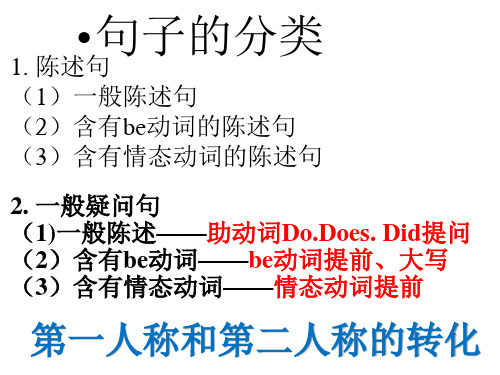
1. 陈述句 (1)一般陈述句 (2)含有be动词的陈述句 (3)含有情态动词的陈述句
2. 一般疑问句 (1)一般陈述——助动词Do.Does. Did提问 (2)含有be动词——be动词提前、大写 (3)含有情态动词——情态动词提前
第一人称和第二人称的转化
3. 特殊疑问句 (1)特殊疑问词+助动词Do.Does. Did引导的 一般疑问句 (2)特殊疑问词+be动词引导的句子 (3)特殊疑问词+情态动词引导的句子
时态4:一般将来时
1.概念:表示将来要发生的事情 。 2.结构: (1)主语+will+动词 原形+其 他
(2)主语+wboe ngo'intg to + 动词
原形+其他
Exercise
情态动词
1.概念:多表示建议或要求。 2.结构: (1)主语+情态动词 +动词原 形+其他
can. could. should. shouldn't. must. mustn't. May. Shall.
3. 对划线部分1提问:
4. 对划线部分2提问:
There are some English books in the box.
1. 改为单数句:
2. 改为一般疑问句:
3. 对划线部分1提问:
4. 对划线部分2提问:
•Exercise
二、单数句变复数句:
人称变化法则: 1. I 变 We,me 变 us,my 变 our 2. you 变 you,your 变 your 3. he she it 变 they,him her it 变 them,
陕旅版小学六年级英语总复习之语法

陕旅版小学六年级英语总复习之语法The document was prepared on January 2, 2021小学英语语法及习题一、名词复数规则1.一般情况下,直接加-s,如:book-books, bag-bags, cat-cats, bed-beds2.以s. x. sh. ch结尾,加-es,如:bus-buses, box-boxes,brush-brushes, watch-watches3.以“辅音字母+y”结尾,变y为i, 再加-es,如:family-families, strawberry-strawberries4.以“f或fe”结尾,变f或fe为v, 再加-es,如:knife-knives 5.不规则名词复数:man-men, woman-women, policeman-policemen, policewoman-policewomen, mouse-micechild-childrenfoot-feet,.tooth-teethfish-fish, people-people, Chinese-Chinese, Japanese-Japanese 写出下列各词的复数I _________him _________this ___________her ______watch _______child _______photo ________diary ______day________ foot________ book_______ dress ________tooth_______ sheep ______box_______ strawberry _____thief _______yo-yo ______ peach______ sandwich ______man______ woman_______ paper_______ juice___________ water________ milk________ rice__________ tea__________二、一般现在时一般现在时基本用法介绍No. 1一般现在时的功能1.表示事物或人物的特征、状态.如:The sky is blue.天空是蓝色的.2.表示经常性或习惯性的动作.如:I get up at six every day.我每天六点起床.3.表示客观现实.如:The earth goes around the sun.地球绕着太阳转.一般现在时的构成1. be动词:主语+beam,is,are+其它.如:I am a boy.我是一个男孩.2.行为动词:主语+行为动词+其它.如:We study English.我们学习英语.当主语为第三人称单数he, she,it时,要在动词后加"-s"或"-es".如:Mary likes Chinese.玛丽喜欢汉语.一般现在时的变化1. be动词的变化.否定句:主语+ be + not +其它.如:He is not a worker.他不是工人.一般疑问句:Be +主语+其它.如:-Are you a student-Yes. I am. / No, I'm not.特殊疑问句:疑问词+一般疑问句.如:Where is my bike2.行为动词的变化.否定句:主语+ don't doesn't +动词原形+其它.如:I don't like bread.当主语为第三人称单数时,要用doesn't构成否定句.如:He doesn't often play.一般疑问句:Do Does +主语+动词原形+其它.如:- Do you often play football- Yes, I do. / No, I don't.当主语为第三人称单数时,要用does构成一般疑问句.如:- Does she go to work by bike- Yes, she does. / No, she doesn't.特殊疑问句:疑问词+一般疑问句.如:How does your father go to work动词+s的变化规则1.一般情况下,直接加-s,如:cook-cooks, milk-milks2.以s. x. sh. ch. o结尾,加-es,如:guess-guesses, wash-washes, watch-watches, go-goes3.以“辅音字母+y”结尾,变y为i, 再加-es,如:study-studies 一般现在时用法专练:一、写出下列动词的第三人称单数drink ________ go _______ stay ________ make ________look _________ have_______ pass_______ carry ____come________ watch______ plant_______ fly ________ study_______ brush________ do_________ teach_______二、用括号内动词的适当形式填空.1. He often ________have dinner at home.2. Daniel and Tommy _______be in Class One.3. We _______not watch TV on Monday.4. Nick _______not go to the zoo on Sunday.5. ______ they ________like the World Cup6. What _______they often _______do on Saturdays7. _______ your parents _______read newspapers every day8. The girl _______teach us English on Sundays.9. She and I ________take a walk together every evening.10. There ________be some water in the bottle.11. Mike _______like cooking.12. They _______have the same hobby.13. My aunt _______look after her baby carefully.14. You always _______do your homework well.15. I _______be ill. I’m staying in bed.16. She _______go to school from Monday to Friday.17. Liu Tao _______do not like PE.18. The child often _______watch TV in the evening.19. Su Hai and Su Yang _______have eight lessons this term.20. -What day _______be it today-It’s Saturday.三、按照要求改写句子1. Daniel watches TV every evening.改为否定句___________________________________________________2. I do my homework every day.改为一般疑问句,作否定回答________________________________________________________ 3. She likes milk.改为一般疑问句,作肯定回答___________________________4. Amy likes playing computer games.改为一般疑问句,作否定回答___________________________________________________5. We go to school every morning.改为否定句_______________________________________________________ 6. He speaks English very well.改为否定句___________________________________________________7. I like taking photos in the park.对划线部分提问________________________________________________________ 8. John comes from Canada.对划线部分提问___________________________________________________9. She is always a good student.改为一般疑问句,作否定回答________________________________________________________ 10. Simon and Daniel like going skating.改为否定句___________________________________________________五、改错划出错误的地方,将正确的写在横线上1. Is your brother speak English __________________2. Does he likes going fishing __________________3. He likes play games after class. __________________4. Mr. Wu teachs us English. __________________5. She don’t do her homework on Sundays. _________________三、现在进行时1.现在进行时表示现在正在进行或发生的动作,也可表示当前一段时间内的活动或现阶段正在进行的动作.2.现在进行时的肯定句基本结构为be+动词ing.3.现在进行时的否定句在be后加not.4.现在进行时的一般疑问句把be动词调到句首.5.现在进行时的特殊疑问的基本结构为:疑问词 + be + 主语 + 动词ing但疑问词当主语时其结构为:疑问词 + be + 动词ing动词加ing的变化规则1.一般情况下,直接加ing,如:cook-cooking2.以不发音的e结尾,去e加ing,如:make-making, taste-tasting 3.如果末尾是一个元音字母和一个辅音字母,双写末尾的辅音字母,再加ing,如:run-running, stop-stopping现在进行时专项练习:一、写出下列动词的现在分词:play________ run__________ swim _________make__________go_________ like________ write________ _ski___________read________ have_________ sing ________ dance_________put_________ see________ buy _________ love____________live_______ take_________ come ________ get_________stop_________ sit ________ begin________ shop___________ 二、用所给的动词的正确形式填空:boy __________________ drawa picture now.2. Listen .Some girls _______________ singin the classroom .3. My mother_________________ cook some nice food now.4. What _____ you ______ do now5. Look . They _______________ have an English lesson . ____________not ,water the flowers now.the girls ________________dance in the classroom .is our granddaughter doing She _________listen to music.9. It’s 5 o’clock now. We _____________havesupper now wash clothes Yes ,she is .三、句型转换:1. They are doing housework .分别改成一般疑问句和否定句____________________________________________________________ ____________________________________________________________ __2.The students are cleaning the classroom . 改一般疑问句并作肯定和否定回答____________________________________________________________ ____________________________________________________________ __________3.I’m playing the football in the playground .对划线部分进行提问____________________________________________________________ _____4.Tom is reading books in his study . 对划线部分进行提问四、将来时一、概念:表示将要发生的动作或存在的状态及打算、计划或准备做某事.句中一般有以下时间状语:tomorrow, next dayweek, month, year…,soon, the day after tomorrow后天等.二、基本结构:①be going to + do;②will+ do. 三、否定句:在be动词am, is, are后加not或情态动词will后加not成won’t.例如:I’m going to have a picnic this afternoon.→ I’m not going to have a picnic this afternoon.四、一般疑问句: be或will提到句首,some改为any, and改为or,第一二人称互换.例如:We are going to go on an outing this weekend. → Are you going to go on an outing this weekend五、对划线部分提问.一般情况,一般将来时的对划线部分有三种情况.1. 问人.Who 例如:I’m go ing to New York soon. →Who’s going to New York soon.2. 问干什么.What … do.例如: My father is going to watch a race with me thisafternoon. →What is your father going to do with you this afternoon.3. 问什么时候.When.例如:She’s going to go to bed at nine. →When is she goi ngto bed六、同义句:be going to = willI am going to go swimming tomorrow明天. = I will go swimming tomorrow. 练习:填空.1. 我打算明天和朋友去野炊.I_____ _______ _________ have a picnic with my friends.I ________ have a picnic with my friends.2. 下个星期一你打算去干嘛我想去打篮球.What ________ ________ _________ _________ _________ next Monday I _______ ______ _____ play basketball.What _________ you do next Monday I ________ play basketball.3. 你妈妈这个周末去购物吗是,她要去买一些水果._____ your mother _______ ________ go shopping this___________ Yes, she _________. She ______ __________________ buy some fruit.4. 你们打算什么时候见面.What time _______ you _________ __________ meet改句子.5. Nancy is going to go camping.改否定Nancy ________ going to go camping.6. I’ll go and join them.改否定I _______ go ______ join them.7. I’m going to get up at 6:30 tomorrow.改一般疑问句________ _______ ________ to get up at 6:30 tomorrow8. We will meet at the bus stop at 10:30.改一般疑问句_______________ meet at the bus stop at 10:30.9. She is going to listen to music after school.对划线部分提问________ _______ she ________ ________ _________ after school10. My father and mother are going to see a play the day after tomorrow.同上_________ _________ going to see a play the day after tomorrow全身心记忆法根据测试,参与记忆单词的器官和身体部位越多,单词在大脑中的印象就越深刻,记忆的时间也就越长.边读边写边记,除读记所使用的发音器官和身体的其它部位外,大脑中枢还要指挥大臂带动小臂,小臂带动手掌,手掌带动手指,从而正确地书写单词.这种方法避免了"小和尚念经",因为只要注意力不集中,书写马上就出错.书写既是大脑中枢的执行行为,又是大脑中枢的监察器. 联系记忆法联系记忆法就是在记忆单词的过程中,不去孤立地记一个词或词组,而是把它与同义词、反义词、相关词、句、篇等联系起来记忆. 同义记忆与近义记忆掌握一个词或词组的同义词和近义词或者其解释是掌握该语言重要的一环.只有这样,才能初步做到用英语进行思维,而用英语思维是掌握英语的一个标志. 同类记忆与比较记忆同类记忆的涵盖面很广,如词性同类、动物同类、植物同类、事情同类、物品同类等.如我们可以把边际从属连词放在一起记忆.比较记忆是把词形相近或意义相近的词放在一起对比记忆.这样记忆可以辨别词义,准确使用词汇. 联想记忆 "联想是钓钩,在茫茫的艺海中,它能准确地钩住你所识记的事物."联想越丰富,越多彩,记忆的艺术也就越高超.记忆以联想为基础;联想又是记忆的一种方法.联想又分为类似联想、类别联想和词、句、篇联想. 无意识记忆法无意识记忆并不是无注意力记忆,而是时间分散记忆.这种方法特别适合于工作忙碌的人.首先准备一个袖珍笔记本,将要记忆的单词写在笔记本上.只要有时间就拿出来读读.这些单词见多了对你就会产生感情,你一定能记住,因为每读记一遍,就在你的大脑中加深一层印象.这样记忆的单词可长久不忘,并能随时想起,是一种很好的长时记忆法. 构词记忆法利用英语词汇的构词规律,内在结构记忆单词是一种理性地使自己词汇量膨胀起来的方法.英语单词是由词素构成的,词素分为自由词素和粘附词素.记忆单词主要是记自由词素,因为有些自由词素可以充当词根,词根加词缀构成许多派生词.构词法主要有三种:转化、合成和派生.。
小学六年级英语语法总复习PPT课件

• 小学阶段不规则动词全表
• Infinitive Past tense Infinitive
• 1. am, is
was
2. keep
• 3.are
were
5. make made
4.become
7. blow
blew
8. read
• 9. buy
bought
10. ride
• 11. catch caught
fly-flying walk-walking
jump-jumping sleep-sleeping
climb-climbing fight-fighting
swing-swinging drink-drinking catch-catching pick-picking
watch-watching play-playing
dance danced
变y为 i+ed
study studied
动词的过去式(不规则)
go-went read-read eat-ate sing-sang take-took buy-bought see-saw swim-swam am,is-was do-did are-were have-had get-got leave-left fly-flew stop-stopped(双写)
.
• 一般现在时的变化
1. be动词的变化。
否定句:主语+ be + not +其它。 如:He is not a worker.他不是工人 一般疑问句:Be +主语+其它。 如:-Are you a student? -Yes. I am. / No, I‘m not. 特殊疑问句:疑问词+一般疑问句。如:Where is my bike?
小学英语六年级语法复习要点
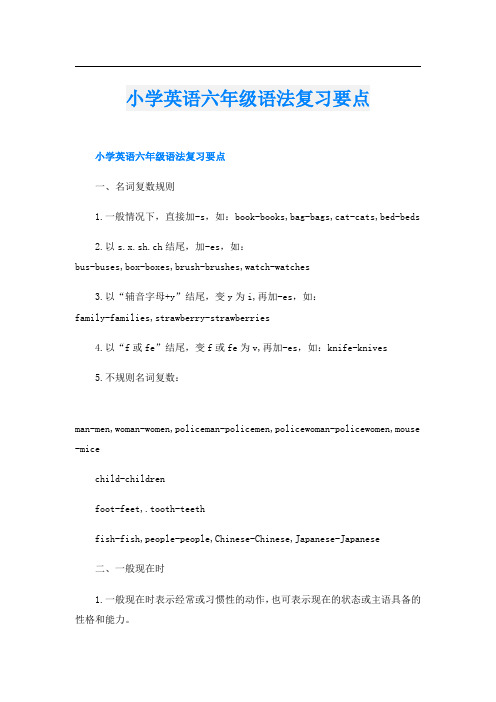
小学英语六年级语法复习要点小学英语六年级语法复习要点一、名词复数规则1.一般情况下,直接加-s,如:book-books,bag-bags,cat-cats,bed-beds2.以s.x.sh.ch结尾,加-es,如:bus-buses,box-boxes,brush-brushes,watch-watches3.以“辅音字母+y”结尾,变y为i,再加-es,如:family-families,strawberry-strawberries4.以“f或fe”结尾,变f或fe为v,再加-es,如:knife-knives5.不规则名词复数:man-men,woman-women,policeman-policemen,policewoman-policewomen,mouse -micechild-childrenfoot-feet,.tooth-teethfish-fish,people-people,Chinese-Chinese,Japanese-Japanese二、一般现在时1.一般现在时表示经常或习惯性的动作,也可表示现在的状态或主语具备的性格和能力。
2.一般现在时中,没有be动词和情态动词,主语为第三人称单数的肯定句,动词要按规则加上s,主语是非第三人称单数的肯定句,动词用原形。
3.在一般现在时中,句中有be动词或情态动词时,否定句在be动词和情态动词后加not,一般疑问句将be动词或情态动词放在句首。
4.在一般现在时中,句中没有be动词或情态动词时,主语为第三人称单数的否定句在动词前加does+not(doesn’t),一般疑问句在句首加does,句子中原有动词用原形;主语为非第三人称单数,否定句用do+not(don’t),一般疑问句在句首加do,句子中动词用原形。
动词+s的变化规则1.一般情况下,直接加-s,如:cook-cooks,milk-milks2.以s.x.sh.ch.o结尾,加-es,如:guess-guesses,wash-washes,watch-watches,go-goes3.以“辅音字母+y”结尾,变y为i,再加-es,如:study-studies三、现在进行时1.现在进行时表示现在正在进行或发生的动作,也可表示当前一段时间内的活动或现阶段正在进行的动作。
小学六年级英语语法知识点总结归纳
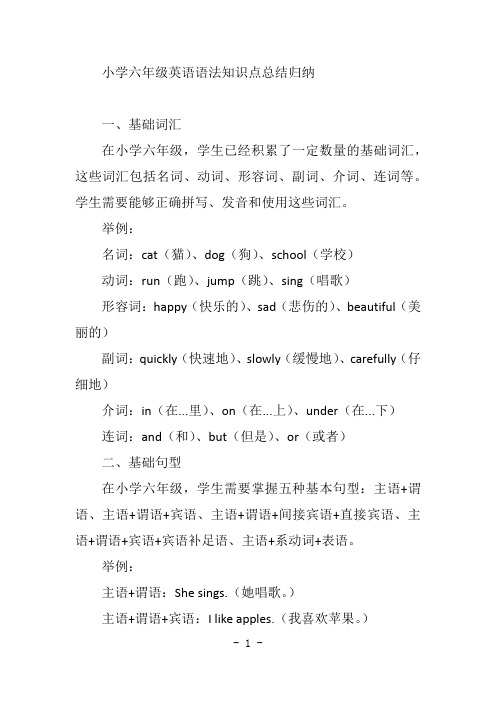
小学六年级英语语法知识点总结归纳一、基础词汇在小学六年级,学生已经积累了一定数量的基础词汇,这些词汇包括名词、动词、形容词、副词、介词、连词等。
学生需要能够正确拼写、发音和使用这些词汇。
举例:名词:cat(猫)、dog(狗)、school(学校)动词:run(跑)、jump(跳)、sing(唱歌)形容词:happy(快乐的)、sad(悲伤的)、beautiful(美丽的)副词:quickly(快速地)、slowly(缓慢地)、carefully(仔细地)介词:in(在...里)、on(在...上)、under(在...下)连词:and(和)、but(但是)、or(或者)二、基础句型在小学六年级,学生需要掌握五种基本句型:主语+谓语、主语+谓语+宾语、主语+谓语+间接宾语+直接宾语、主语+谓语+宾语+宾语补足语、主语+系动词+表语。
举例:主语+谓语:She sings.(她唱歌。
)主语+谓语+宾语:I like apples.(我喜欢苹果。
)主语+谓语+间接宾语+直接宾语:My mother gave me a book.(我妈妈给了我一本书。
)主语+谓语+宾语+宾语补足语:They elected him their monitor.(他们选他为班长。
)主语+系动词+表语:She is happy.(她很高兴。
)三、时态在小学六年级,学生需要掌握一般现在时、现在进行时、一般过去时和一般将来时这四种时态的基本用法。
举例:一般现在时:She always goes to school on time.(她总是按时上学。
)现在进行时:She is studying now.(她现在正在学习。
)一般过去时:Yesterday, we visited the zoo.(昨天,我们参观了动物园。
)一般将来时:I will go to the park tomorrow.(我明天将去公园。
)四、动词的基本形式学生需要了解动词的基本形式,包括原形、第三人称单数形式、现在分词、过去式和过去分词。
2023年小学英语六年级小升初语法总复习(二)现在进行时 (译林版含答案)

2023年小升初语法总复习(二)现在进行时1.现在进行时的定义:表示现在正在进行或发生的动作,也可表示当前一段时间内的活动或现阶段正在进行的动作。
句中一般含有now, look, listen等词。
2.现在进行时的句型结构:(1)肯定句:主语+be动词+现在分词+其他.如:Tom is reading newspapers in the living room.汤姆正在客厅里看报纸。
(2)否定句:主语+be动词+not+现在分词+其他.如:Tom is not reading newspapers in the living room.汤姆没有在客厅里看报纸。
(3)一般疑问句:Be动词+主语+其他?(be动词提到句首)如:Is Tom reading newspapers in the living room?汤姆正在客厅里看报纸吗?(4)特殊疑问句:特殊疑问词+一般疑问句?【注意】当画线部分包含谓语动词时,用特殊疑问词代替画线部分放到句首,原画线处应加上doing。
如:Tom is reading newspapers in the living room.(对画线部分提问)What is Tom doing in the living room?3.动词现在分词的变化规则:(1)一般情况下,在词尾直接加-ing。
如:cook-cooking, look-looking, listen-listening。
(2)以不发音的e结尾的单词,去e加-ing。
如:make-making, taste-tasting。
(3)以重读闭音节结尾,且词尾只有一个辅音字母,则双写这个辅音字母,再加-ing。
如:run-running, stop-stopping, put-putting。
【即时演练】一、单项选择。
( )1.My brother his car in the garden now.A.washesB.is washingC.washed( )2.—Can Peter play games with us, Mrs Frank?—No. He a shower at this moment.A.is takingB.takesC.took( )3.Tom often swimming. But now he football.A.go; is playingB.goes; playsC.goes; is playing ( )4.—Alice, don’t play the guitar! I on the phone.—Oh, sorry, Mum.A.talkingB.talkC.am taking ( )5.Shh! My sister now.A.sleepsB.is sleepingC.sleep( )6.Listen! Mary an English song in the classroom.A.is singingB.singC.sings二、用所给单词的适当形式填空。
(完整)小学英语六年级总复习语法及练习题(一)
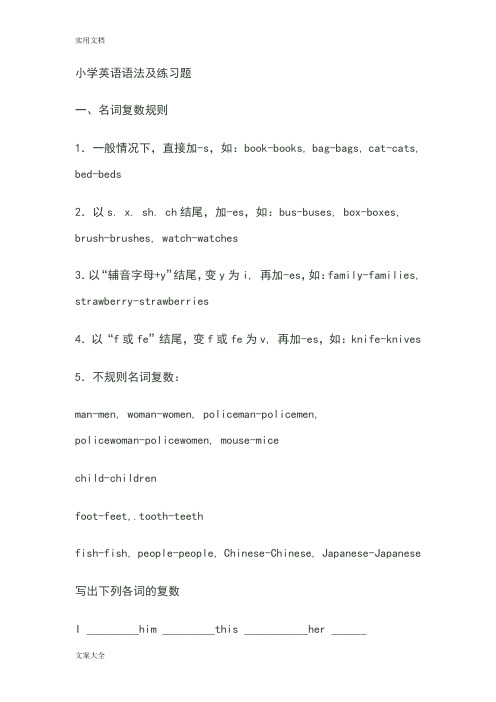
小学英语语法及练习题一、名词复数规则1.一般情况下,直接加-s,如:book-books, bag-bags, cat-cats, bed-beds2.以s. x. sh. ch结尾,加-es,如:bus-buses, box-boxes, brush-brushes, watch-watches3.以“辅音字母+y”结尾,变y为i, 再加-es,如:family-families, strawberry-strawberries4.以“f或fe”结尾,变f或fe为v, 再加-es,如:knife-knives 5.不规则名词复数:man-men, woman-women, policeman-policemen,policewoman-policewomen, mouse-micechild-childrenfoot-feet,.tooth-teethfish-fish, people-people, Chinese-Chinese, Japanese-Japanese 写出下列各词的复数I _________him _________this ___________her ______watch _______child _______photo ________diary ______day________ foot________ book_______ dress ________tooth_______ sheep ______box_______ strawberry _____thief _______yo-yo ______ peach______ sandwich ______man______ woman_______ paper_______ juice___________ water________ milk________ rice__________ tea__________ 二、一般现在时一般现在时基本用法介绍【No. 1】一般现在时的功能1.表示事物或人物的特征、状态。
小学六年级英语语法知识点汇总1
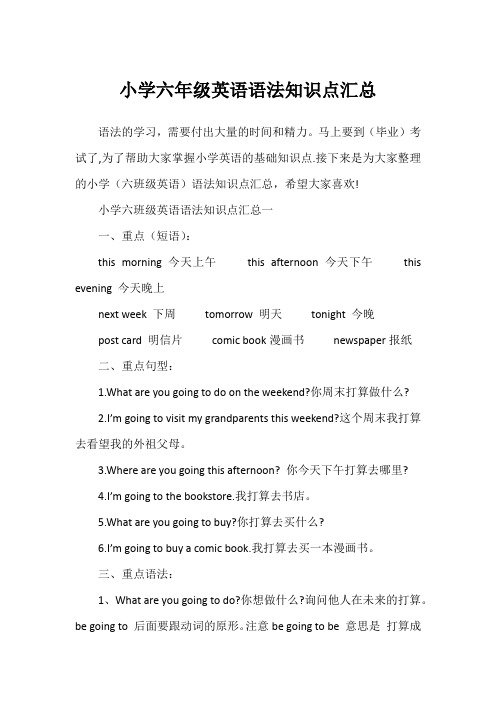
小学六年级英语语法知识点汇总语法的学习,需要付出大量的时间和精力。
马上要到(毕业)考试了,为了帮助大家掌握小学英语的基础知识点.接下来是为大家整理的小学(六班级英语)语法知识点汇总,希望大家喜欢!小学六班级英语语法知识点汇总一一、重点(短语):this morning 今天上午this afternoon 今天下午this evening 今天晚上next week 下周tomorrow 明天tonight 今晚post card 明信片comic book漫画书newspaper报纸二、重点句型:1.What are you going to do on the weekend?你周末打算做什么?2.I’m going to visit my grandparents this weekend?这个周末我打算去看望我的外祖父母。
3.Where are you going this afternoon? 你今天下午打算去哪里?4.I’m going to the bookstore.我打算去书店。
5.What are you going to buy?你打算去买什么?6.I’m going to buy a comic book.我打算去买一本漫画书。
三、重点语法:1、What are you going to do?你想做什么?询问他人在未来的打算。
be going to 后面要跟动词的原形。
注意be going to be 意思是打算成为什么,干什么职业。
注意一下(句子)的区别,找出正确回答。
What are you going to do this afternoon?What are you going to buy?What are you going to be?When? are you going?Where are you going?How are you going?Who are you going with?2、this evening 和tonight的区别:this evening指的是今天晚上睡觉以前的时间,一般指晚上十二点以前。
苏教版小学六年级英语语法总复习

苏教版小学六年级英语语法总复习TTA standardization office【TTA 5AB- TTAK 08- TTA 2C】小学六年级英语语法总复习一:写出下列动词的第三人称单数形式。
sit____ swim____ go ___ make _____run____ write____ cry____ study_____watch____wash____ say____ play ____二:用do does填空:you ride a bike after school Yes, I ____.you sister like PE No, she ____ not.3. What ___ the students have They have some pens.___ Linda go to school She goes to school She goes to school on foot.watch TV on Sundays Yes, they ____.___not speak English. He speaks Chinese.7. My father and mother ___ not read newspapers on Saturday.三:用一般现在时填空。
1. What ___he ___ (have) He ___ ( have) a toy plane.2. My mother ____ not ____ ( like) English. She ____ ( like) Chinese.3. ___ you ___ ( go) to school by bus No, I ___ ( go) to school by car.4. Miss Wang ____ ( swim) every day.5. I ___ ( like) English. Tom ____ ____ ____ (not like) English.6. The moon ____ ( go) around the earth.7. When ___ you ___ (go) to school I ___ (go) to school at five every day.四:写出下列动词的现在分词。
六年级英语语法总复习课堂用练习题答案
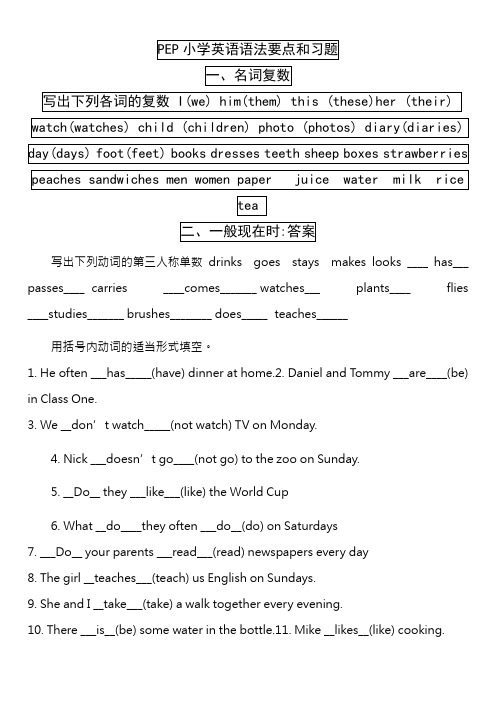
写出下列动词的第三人称单数drinks goes stays makes looks ____ has___ passes____ carries ____comes_______ watches___ plants____ flies ____studies_______ brushes________ does_____ teaches______用括号内动词的适当形式填空。
1. He often ___has_____(have) dinner at home.2. Daniel and Tommy ___are____(be) in Class One.3. We __don’t watch_____(not watch) TV on Monday.4. Nick ___doesn’t go____(not go) to the zoo on Sunday.5. __Do__ they ___like___(like) the World Cup6. What __do____they often ___do__(do) on Saturdays7. ___Do__ your parents ___read___(read) newspapers every day8. The girl __teaches___(teach) us English on Sundays.9. She and I __take___(take) a walk together every evening.10. There ___is__(be) some water in the bottle.11. Mike __likes__(like) cooking.12. They __have__(have) the same hobby.13. My aunt looks(look) after her baby carefully.14. You always __do___(do) your homework well.15. I __am__(be) ill. I’m staying in bed.16. She __goes__(go) to school from Monday to Friday.17. Liu Tao __does_(do) not like PE.18. The child often __watches___(watch) TV in the evening.19. Su Hai and Su Yang __have__(have) eight lessons this term.20. -What day __is__(be) it today-It’s Saturday.按照要求改写句子1. Daniel doesn’t watch TV every evening.2. Do you do your homework every dayYes, I do.3. Does she like milk Yes, she does.4. Does Amy like playing computer games No, she doesn’t.5. We don’t go to school every morning.6. He doesn’t speak English very well.7. What do you like in the park.8. John comes from Canada.(对划线部分提问)___________________________________________________9. She is always a good student.(改为一般疑问句,作否定回答)________________________________________________________10. Simon and Daniel like going skating.(改为否定句)___________________________________________________改错(划出错误的地方,将正确的写在横线上)1. Is your brother speak English __________________2. Does he likes going fishing __________________3. He likes play games after class. __________________4. Mr. Wu teachs us English. __________________5. She don’t do her homework on Sundays. _________________写出下列动词的现在分词:play____ run_____ swim _____make____go______ like____ write____ ski_____read_____ have_____sing ___ dance____put______see_____ buy ______ love_____live______ take____ come ____ get_____stop_______ sit _____ begin_____ shop________用所给的动词的正确形式填空:1.The boy __________________ ( draw)a picture now.2. Listen .Some girls _______________ ( sing)in the classroom .3. My mother _________________ ( cook )some nice food now.4. What _____ you ______ ( do ) now5. Look . They _______________( have) an English lesson .6.They ____________(not ,water) the flowers now.7.Look! the girls ________________(dance )in the classroom .8.What is our granddaughter doing She _________(listen ) to music.9. It’s 5 o’clock now. We _____________(have)supper now10.______Helen____________(wash )clothes Yes ,she is .句型转换:1. They are doing housework .(分别改成一般疑问句和否定句)____________________________________________________________________________________________________________2.The students are cleaning the classroom . ( 改一般疑问句并作肯定和否定回答) __________________________________________________________________________________________________________________3.I’m playing the foot ball in the playground .(对划线部分进行提问)________________________________________________________4.Tom is reading books in his study . (对划线部分进行提问)_________________________________________________________填空。
(完整版)小学六年级人教版英语总复习及知识点
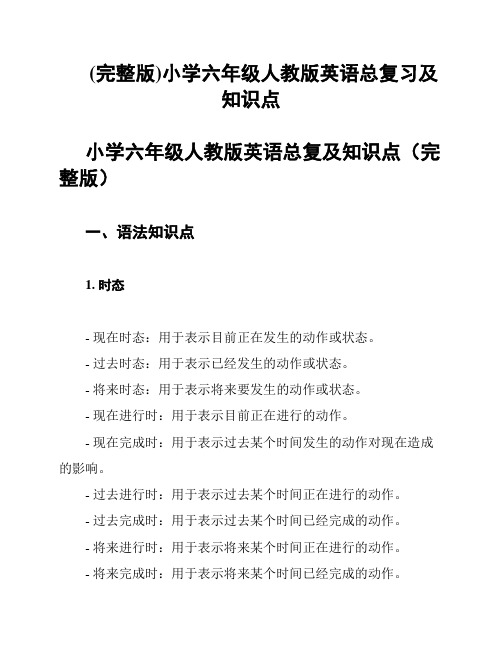
(完整版)小学六年级人教版英语总复习及知识点小学六年级人教版英语总复及知识点(完整版)一、语法知识点1. 时态- 现在时态:用于表示目前正在发生的动作或状态。
- 过去时态:用于表示已经发生的动作或状态。
- 将来时态:用于表示将来要发生的动作或状态。
- 现在进行时:用于表示目前正在进行的动作。
- 现在完成时:用于表示过去某个时间发生的动作对现在造成的影响。
- 过去进行时:用于表示过去某个时间正在进行的动作。
- 过去完成时:用于表示过去某个时间已经完成的动作。
- 将来进行时:用于表示将来某个时间正在进行的动作。
- 将来完成时:用于表示将来某个时间已经完成的动作。
2. 语法结构- 名词:用于表示人、动物、物体、地点等。
- 动词:用于表示动作或状态。
- 形容词:用于描述名词的特征或状态。
- 副词:用于修饰动词、形容词或其他副词。
- 介词:用于表示位置、时间或关系等。
- 代词:用于替代名词。
- 数词:用于表示数量。
- 冠词:用于限定名词的范围。
- 连词:用于连接词语、短语或句子。
3. 句子结构- 主语:句子中执行动作或承受动作的人或事物。
- 谓语:句子中说明主语动作或状态的部分。
- 宾语:句子中接受动作的人或事物。
- 定语:用于修饰名词或代词的成分。
- 状语:用于修饰动词、形容词、副词或整个句子的成分。
- 表语:用于说明主语的状态或特征的部分。
二、总复内容1. 单词- 请根据教材中的单词表,复并牢记相关的单词拼写和意思。
2. 句子- 复教材中的对话和句子,理解并掌握其基本意思和用法。
3. 对话- 复教材中的对话,掌握其中的日常生活用语和表达方式。
4. 语法- 复教材中的语法知识点,加深对时态、语法结构和句子成分的理解。
三、研究方法1. 多听多说- 多听英语教材、歌曲或英语广播,提高听力水平。
- 多说英语,练口语表达和语音准确性。
2. 多读多写- 多读英语教材、故事书等,提高阅读理解能力。
- 多写英语作文,锻炼自己的写作能力和语法运用。
2023年小学英语六年级小升初语法总复习(三)一般过去时 (译林版含答案)
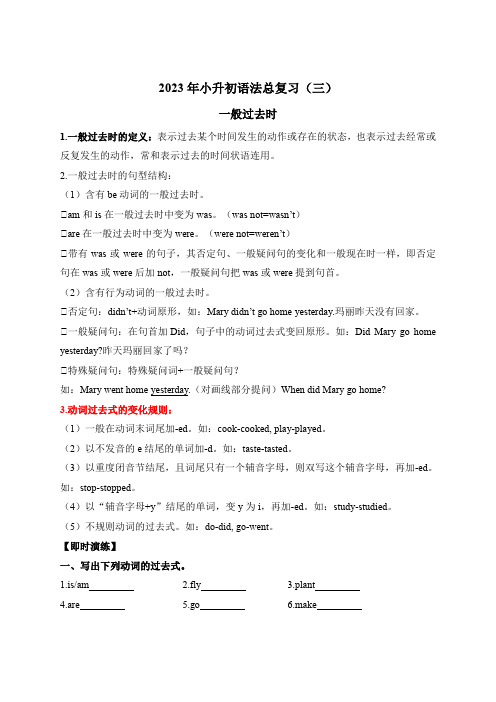
2023年小升初语法总复习(三)一般过去时1.一般过去时的定义:表示过去某个时间发生的动作或存在的状态,也表示过去经常或反复发生的动作,常和表示过去的时间状语连用。
2.一般过去时的句型结构:(1)含有be动词的一般过去时。
①am和is在一般过去时中变为was。
(was not=wasn’t)①are在一般过去时中变为were。
(were not=weren’t)①带有was或were的句子,其否定句、一般疑问句的变化和一般现在时一样,即否定句在was或were后加not,一般疑问句把was或were提到句首。
(2)含有行为动词的一般过去时。
①否定句:didn’t+动词原形,如:Mary didn’t go home yesterday.玛丽昨天没有回家。
①一般疑问句:在句首加Did,句子中的动词过去式变回原形。
如:Did Mary go home yesterday?昨天玛丽回家了吗?①特殊疑问句:特殊疑问词+一般疑问句?如:Mary went home yesterday.(对画线部分提问)When did Mary go home?3.动词过去式的变化规则:(1)一般在动词末词尾加-ed。
如:cook-cooked, play-played。
(2)以不发音的e结尾的单词加-d。
如:taste-tasted。
(3)以重度闭音节结尾,且词尾只有一个辅音字母,则双写这个辅音字母,再加-ed。
如:stop-stopped。
(4)以“辅音字母+y”结尾的单词,变y为i,再加-ed。
如:study-studied。
(5)不规则动词的过去式。
如:do-did, go-went。
【即时演练】一、写出下列动词的过去式。
1.is/am2.fly3.plant4.are5.go6.make7.taste 8.throw 9.ask10.buy 11.bring 12.draw13.kick 14.dance 15.catch16.play 17.drink 18.put二、用所给动词的适当形式填空。
(完整版)小学六年级英语语法知识汇总

(完整版)小学六年级英语语法知识汇总小学六年级英语语法知识汇总一、词类:1、动词:行为动词、be动词、情态动词。
(1)行为动词原形、+s/es、+ed、+ing,具体推断办法如下:(2)be动词a、Am--was Is --was Are--were 口诀:我用am, 你用are, is用在他她它,所有复数全用are。
b、确信和否定句I am (not) from London. He /She is(not) a teacher. My hair is(not) long. Her eyes are(not) small.c、普通疑咨询句Am I …? Yes, you are. No, you aren’t. Are you/they…? Yes,w e/ they are. No,we/ they aren’t. Is the cat fat? Yes, it is. No, it isn’t.is、am、are为一类,普通用于普通如今时、如今举行时和普通未来时中。
was和were为另一类,普通用于普通过去时。
(3)情态动词can、must、should、would、may。
情态动词后动词总是用原形。
(别受其他任何条件妨碍)2、名词这个地方强调两点:别可数名词都默以为单数,因此总是用is或者was。
怎么加后缀:a.普通事情下,直截了当加-s,如:book-books, bag-bags, cat-cats, bed-bedsb.以s. x. sh. ch结尾,加-es,如:bus-buses, box-boxes, brush-brushes, watch-watchesc.以“辅音字母+y”结尾,变y为i, 再加-es,如:family-families,strawberry-strawberriesd.以“f或fe”结尾,变f或fe为v, 再加-es,如:knife-knivese.别规则名词复数:man-men, woman-women, policeman-policemen, policewoman-policewomen, mouse-mice child-childrenfoot-feet ,.tooth-teeth fish-fish, people-people, Chinese-Chinese, Japanese-Japanese3、形容词(包括副词)形容词表示某一事物或的特征,副词表示某一动作的特征。
2023年小学六年级毕业英语语法复习要点归纳人教版

小学英语语法点复习归纳一、名词复数规则1.一般状况下,直接加-s,如:book-books, bag-bags, cat-cats, bed-beds 2.以s、x、sh、ch结尾,加-es,如:bus-buses, box-boxes, brush-brushes, watch-watches3.以“辅音字母+y”结尾,变y为i, 再加-es,如:family-families, strawberry-strawberries4.以“f或fe”结尾,变f或fe为v, 再加-es,如:knife-knives5.不规则名词复数:man- , woman- , policeman-policewoman- , mouse- child-foot- ,.tooth- fish- , people- ,Chinese- , Japanese-I _________him _________this ___________her ______watch _______that _______photo ________diary ______day________ foot________ book_______ dress ________tooth_______ sheep ______box_______ strawberry _____thief _______yo-yo ______ peach______ sandwich ______tomato______ potato_______ paper_______ juice___________water________ milk________ rice__________ tea__________pork mutton二、一般目前时1.重点:(句子特性;以及第三人称动词旳变化原则)2. 句子出现旳时间标志为:often, usually, everyday,…等词汇)3. 动词变化规则:1).一般状况下,直接加-s,如:cook-cooks, milk-milks,climbs,cleans 2).以s. x. sh. ch. o结尾,加-es,如:guess-guesses, wash-washes, watch-watches, go-goes3).以“辅音字母+y”结尾,变y为i, 再加-es,如:study-studies专题练习:一.写出一下东西旳第三人称单数形式:drink ________ go _______ stay ________ make ________look _________ have_______ pass_______ carry ____come________ watch______ plant_______ fly ________study_______ brush________ do_________ teach_______二.用所给单词旳对旳形式填空1. He often ________(have) dinner at home.2. Daniel and Tommy _______(be) in Class One.3. We _______(not watch) TV on Monday.4. Nick _______(not go) to the zoo on Sunday.5. ______ they ________(like) the World Cup?6. What _______they often _______(do) on Saturdays?7. _______ your parents _______(read) newspapers every day?8. The girl _______(teach) us English on Sundays.9. She and I ________(take) a walk together every evening.10. There ________(be) some water in the bottle.11. Mike _______(like) cooking.12. They _______(have) the same hobby.13. My aunt _______(look) after her baby carefully.14. You always _______(do) your homework well.15. I _______(be) ill. I’m staying in bed.16. She _______(go) to school from Monday to Friday.17. Liu Tao _______(do) not like PE.18. The child often _______(watch) TV in the evening.19. Su Hai and Su Yang _______(have) eight lessons this term.20. What day _______(be) it today?三、目前进行时1.概念:表达正在进行旳动作。
六年级英语语法总复习课堂用练习题答案
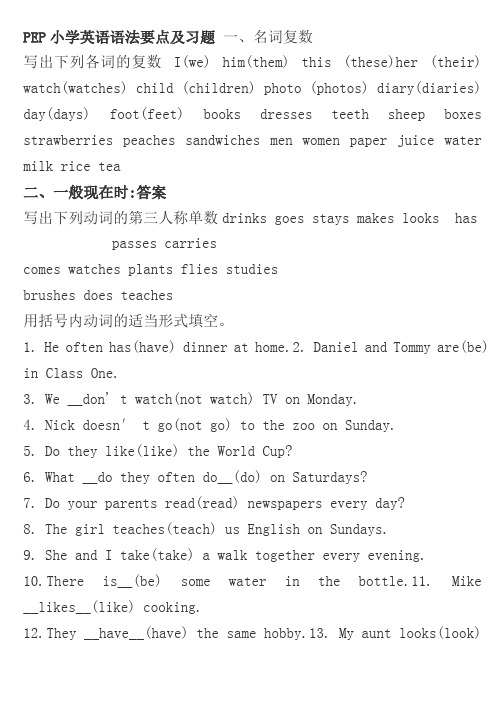
PEP小学英语语法要点及习题一、名词复数写出下列各词的复数I(we) him(them) this (these)her (their) watch(watches) child (children) photo (photos) diary(diaries) day(days) foot(feet) books dresses teeth sheep boxes strawberries peaches sandwiches men women paper juice water milk rice tea二、一般现在时:答案写出下列动词的第三人称单数drinks goes stays makes looks has passes carriescomes watches plants flies studiesbrushes does teaches用括号内动词的适当形式填空。
1. He often has(have) dinner at home.2. Daniel and Tommy are(be) in Class One.3.We __don' t watch(not watch) TV on Monday.4.Nick doesn′ t go(not go) to the zoo on Sunday.5.Do they like(like) the World Cup?6.What __do they often do__(do) on Saturdays?7.Do your parents read(read) newspapers every day?8.The girl teaches(teach) us English on Sundays.9.She and I take(take) a walk together every evening.10.T here is__(be) some water in the bottle.11. Mike __likes__(like) cooking.12.T hey __have__(have) the same hobby.13. My aunt looks(look)after her baby carefully.14.Y ou always __do(do) your homework well.15. I am__(be) ill. I'm staying in bed.16.S he goes(go) to school from Monday to Friday.17. Liu Tao __does_(do) not like PE.18.T he child often watches(watch) TV in the evening.19.S u Hai and Su Yang __have__(have) eight lessons this term.20.—What day is__(be) it today?— It's Saturday.按照要求改写句子1.Daniel doesn' t watch TV every evening.2.Do you do your homework every day? Yes, I do.3.Does she like milk? Yes, she does.4.Does Amy like playing computer games? No, she doesn' t.5.We don' t go to school every morning.6.He doesn' t speak English very well.7.What do you like in the park.8.John comes from Canada.(对划线部分提问)9.She is always a good student. 改为一般疑问句,作否定回答)10.S imon and Daniel like going skating.(改为否定句) 改错(划出错误的地方,将正确的写在横线上)English?_________________ 2.Does he likes going fishing?_________________ 3.He likes play games after class._________________ 4.Mr. Wu teachs us English._________________ 5. She don't do her homework on Sundays.二、现在进行时:写出下列动词的现在分词:play ___ run _____ s wim _____ m akego like write ski read __ have_ sing __ dance_ __ put __ __ see __ __ buy ___ ___ lovelive take come get stop sitbegin shop用所给的动词的正确形式填空:1 .The boy( draw)a picture now.2 . Listen . Some girls( sing)in the classroom .3 . My mother( cook )some nice food now.4 . What you( do ) now?5 . Look . They( have) an English lesson .6 .They(not , water) the flowers now.1. Is your brother speak7.Look! the girls(dance )in the classroom .8.What is our granddaughter doing? She (listen ) tomusic.9. It's 5 o'clock now. We (have)supper now10.Helen(wash )clothes? Yes ,she is .句型转换:1.They are doing housework .(分别改成一般疑问句和否定句)2.The students are cleaning the classroom .(改一般疑问句并作肯定和否定回答)3.I’m playing the football in the playground .(对划线部分进行提问)4. Tom is reading books in his study .(对划线部分进行提问)四、一般将来时:填空。
小学六年级英语语法与词汇汇总
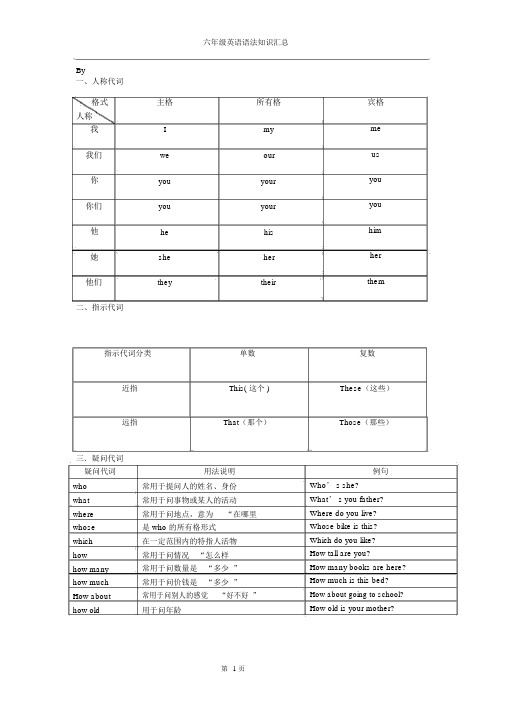
六年级英语语法知识汇总By一、人称代词格式主格所有格人称我I my 我们we our你you your 你们you your他he his她she her 他们they their 二、指示代词指示代词分类单数近指This( 这个 )远指That(那个)三.疑问代词疑问代词用法说明who常用于提问人的姓名、身份what常用于问事物或某人的活动where常用于问地点,意为“在哪里whose是 who 的所有格形式which在一定范围内的特指人活物how常用于问情况“怎么样how many常用于问数量是“多少”how much常用于问价钱是“多少”How about常用于问别人的感觉“好不好”how old用于问年龄宾格meusyouyouhimherthem复数These(这些)Those(那些)例句Who’ s she?What’ s you father? Where do you live? Whose bike is this?Which do you like?How tall are you?How many books are here? How much is this bed? How about going to school? How old is your mother?六年级英语语法知识汇总四、不定代词代替或修饰代替或修饰用法说明例句可数名词不可数名词some一般用于肯定句I have some bookany一般用于否定句、疑问句I don’ t haveany book.Do you have any book?many much用于修饰表示许多的可数/不He has much money,but he doesn ’havet可数名词many friend.五、数字和日期一one二two三three四four五five六six七seven八eight九nine十ten十一eleven十二twelve十三thirteen十四fourteen十五fifteen十六sixteen十七seventeen十八eighteen十九nineteen二十twenty 二十一twenty-one三十thirty三十一thirty-one四十forty五十fifty六十sixty七十seventy八十eighty九十ninety 日期英文写法周一Mondy周二Tuesday周三Wednesday周四Thursday周五Friday周六Saturday周日Sunday天day周末weekend教师节Teacher’s Day元旦New Year国庆节National Day百hundred 第一first 第二second 第三third 六年级英语语法知识汇总一月Jan./January二月Feb./February三月Mar./March四月Apr./April五月May六月June七月July八月Aug./Augest九月Sept./September十月Oct./October十一月Nov./November十二月Dec./December春天Spring夏天Summer秋天Fall冬天Winter一、词类:1、动词:行为动词、be 动词、情态动词。
- 1、下载文档前请自行甄别文档内容的完整性,平台不提供额外的编辑、内容补充、找答案等附加服务。
- 2、"仅部分预览"的文档,不可在线预览部分如存在完整性等问题,可反馈申请退款(可完整预览的文档不适用该条件!)。
- 3、如文档侵犯您的权益,请联系客服反馈,我们会尽快为您处理(人工客服工作时间:9:00-18:30)。
助动词:do /does
• 1)当主语是第一人称I,第二人称you,人称复 数(we/ you /they),名词复数时,用do
• 2)当主语是第三人称单数(he /she/it),人名, 名词单数时,用does
大家好
1
语法复习 动词时态 形容词的比较级 名词的单复数 there be 结构 can的用法 序数词 特殊疑问句 冠词 代词 介词
2
动词时态
• 一般现在时 • 一般过去时 • 一般将来时 • 现在进行时
3
• 一般现在时:
• 表示经常性或习惯性的动作,或表示主语的性 格、能力、特征等,常与often, usually, sometimes,always, every day, on Sundays等时间状语连用。
8
一般过去时:
表示过去的动作或状态,常有明确的时间状语。 如:last weekend, yesterday. 助动词为did. Did后面加动词原形
动词的过去式(规则)
+ed
以e结
尾+d
watch-watched wash-washed clean-cleaned play-played visit-visited climb-climbed learn-learned row-rowed
2.行为动词的变化。
否定句:主语+ don’t( doesn‘t ) +动词原形(+其它)。 如:I don‘t like bread. 当主语为第三人称单数时,要用doesn’t构成否定句。 如:He doesn‘t often play. 一般疑问句:Do( Does ) +主语+动词原形+其它。 如:- Do you often play football?- Yes, I do. / No, I don’t. 当主语为第三人称单数时,要用does构成一般疑问句。 如:- Does she go to work by bike?
- Yes, she does. / No, she doesn‘t. 特殊疑问句:疑问词+一般疑问句。 如:How does your father go to work?
5
• 例:1. I often go to school at 6:00. • Do you go to school at half past six? • Yes, I do. No, I don’t. • 2.He usually does his homework in the
发音为[iz] • 如: teach-teaches [iz]; watch-watches [iz]
4、以“o”结尾的动词,加“es”,读[z] • 如: go-goes [z] do-does [z]
7
• 一般现在时用法专练 • 一、用括号内动词的适当形式填空。 • 1. He often (have) dinner at home. • 2. Daniel and Tommy (be) in Class One. • 3. We (not watch) TV on Monday. • 4. Amy (not go) to the zoo on Sunday. • 5.What they often (do) on Saturdays? • 6. She (go) to school from Monday to Friday. • 7. The child often (watch) TV in the evening. • 二、按照要求改写句子 • 1. She likes milk.(改为一般疑问句,作肯定回答) • • 2. We go to school every morning.(改为否定句) • • 3. Simon and Daniel like going skating.(改为否定句)
4
• 一般现在时的变化
1. be动词的变化。
否定句:主语+ be + not +其它。 如:He is not a worker.他不是工人 一般疑问句:Be +主语+其它。 如:-Are you a student? -Yes. I am. / No, I‘m not. 特殊疑问句:疑问词+一般疑问句。如:Where is my bike?
evening. • Does he usually do his homework in the
evening? • Yes, he does. No, he doesn’t • 3.Mary flies kites on Sundays. • Does Mary fly kites on Sundays? • Yes, she does. No, she doesn’t.
dance danced
变y为 i+ed
study studied
动词的过去式(不规则)
go-went read-read eat-ate sing-sang take-took buy-bought see-saw swim-swam am,is-was do-did are-were have-had get-got leave-left fly-flew stop-stopped(双写)
6
• 动词第三人称单数变化 • 1、大多数动词在词尾加“S”在清辅音后发音
为[s],在浊辅音及元音后发音为 [z]。如: • ①; make-makes [s] ②read-reads [z] ; • 2、以辅音字母加“y”结尾的,要先将“y”变
为“i”,然后再加“es”读[iz] 如: • fly-flies [z]; study-studies [z]; • 3、以“s, x, sh ,ch”结尾的,在词尾加“es”,
9Hale Waihona Puke 肯定回答Did you…? Yes, I did.
Did you..? Yes, we did.
Did he…? Yes, he did.
Did she…? Yes, she did.
